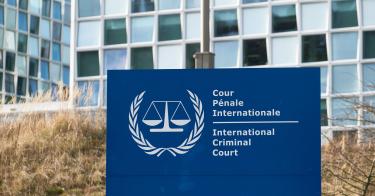New York City’s Democratic nominee for the mayor’s office, Zohran Mamdani, has said that he would arrest Israeli Prime Minister Benjamin Netanyahu if he visited the city, because of the arrest warrant issued by the International Criminal Court (ICC). This would be lawless, since the United States has refused to join the tribunal, and Netanyahu is not accused of committing any crimes here. The same cannot be said for the ICC’s chief prosecutor, Karim Khan, who temporarily stepped down from his post last month facing allegations of sexual assault—some of which allegedly occurred in Manhattan.
That makes Khan subject to a criminal grand jury investigation in New York—leading potentially to an indictment and arrest.
According to reporting in the Wall Street Journal, one of Khan’s accusers, a member of his staff, has told investigators that Khan sexually assaulted her as they traveled to international crime scenes around the world—from the Congo to Colombia to Chad. He also allegedly did so in his wife’s apartment in The Hague, where the tribunal is based—and in a corner suite at the Millennium Hilton Hotel at U.N. Plaza in Manhattan, in an incident the accuser recounts in detail. Khan has repeatedly denied all wrongdoing, claiming the relationships were consensual.
>>> Get the U.S. out of UNESCO for Good
That incident is enough for the New York County district attorney to have jurisdiction. Sex crimes are no less serious when both alleged offender and victim are foreign nationals. Given the large amount of international tourism and commerce that flows through New York, the city has a strong interest in ensuring that its hotel rooms are not seen as a safe haven for assault.
New York County DA Alvin Bragg has dealt with similarly high-profile cases, even when their primary locus was elsewhere. Last year, Bragg indicted Harvey Weinstein, who had already been convicted in California, based on an alleged assault in a Manhattan hotel room.
Khan has earned the ire of President Donald Trump, who has imposed sanctions on him for attempting to extend the ICC’s power to nonmember states. And the highly partisan Bragg is unlikely to investigate someone whom Senator Charles Schumer had sought to shield by blocking an ICC sanctions bill that had passed in the House of Representatives.
If the local justice system is “unable or unwilling” to investigate Khan (to borrow a phrase from the ICC’s statute), federal jurisdiction is available as well in the Southern District of New York. Because the victim came from abroad, charges could be possible under the Mann Act, which makes it a crime to “transport any individual in interstate or foreign commerce” for the purposes of illegal sexual activity.
As her ICC boss, Khan could be said to have “transported” the victim—which includes inducement and does not require physically carrying someone. They were in town for meetings at the United Nations, but the intent to engage in illegal sexual activity need be only one of the motives for the “transportation,” and the alleged pattern of assaults suggests it would have been on his mind.
>>> It’s Time To Hold International Organizations Accountable for Supporting Terrorism
Despite Khan’s alleged international crime spree, there is no reported criminal investigation of him anywhere. This is not surprising, as some of the relevant nations have shoddy and indifferent justice systems—or may fear vexing a man who might still prosecute their government officials. The Journal’s reporting also revealed that Khan invoked arrest warrants against Israeli officials to ward off investigation of the charges—and this ploy may indeed have garnered him goodwill. As for the Netherlands, as the ICC’s host country, it provides broad diplomatic immunity to ICC officials, even for nonofficial acts.
In a departure from its usual practice of internally investigating workplace allegations, the ICC has asked the United Nations Office of Internal Oversight Services to probe the charges. But Khan’s wife had recently worked for the organization, leading women’s rights advocates to criticize the unusual process. The ICC inquiry could result in his dismissal, but not punishment.
New York may be the only place where he could be held accountable. An FBI investigation, potentially including subpoenas to ICC staff members, would be a starting point.
Under international rules of jurisdiction, states have jurisdiction only over crimes committed within their borders. The ICC by extension has jurisdiction only over crimes committed within the territory of its member states. Yet Khan has brought charges against Israeli officials, and threatened them against American senators, despite both countries’ not being members. Yet according to the allegations, he seemed unconcerned about the territorial jurisdiction of U.S. prosecutors in what is often referred to, because of the important figures it often tries, as the “Sovereign District of New York.”
This piece originally appeared in the National Review




